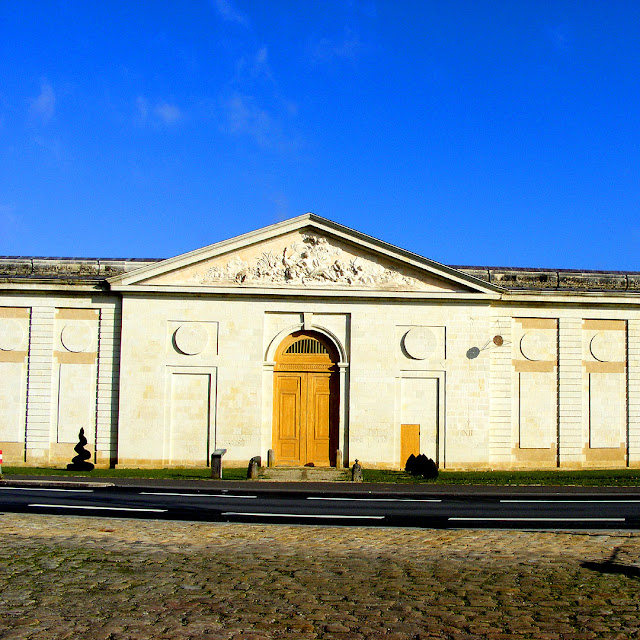Despite the name La Bergerie, which means 'sheepfold', this enormous building in Les Ormes was actually constructed as a gigantic stable for stud horses.
 |
| The central front of La Bergerie, photographed from in front of the chateau gates. The building stretches for many metres left and right but is not very deep. |
It was built for the Marquis Marc-René-Marie d'Argenson in 1766-68 and is one of the few extant works designed by the Parisian architect Charles de Wailly. And if that wasn't enough, it is right next to an equally enormous relais de Poste, considered one of the most notable in France, more for its size than its architectural merit. The Marquis d'Argenson was the Superintendent of Post, so rearranged the postal system to his own satisfaction, including putting Les Ormes on a new major post delivery route.
The original bergerie was indeed a small barn for housing sheep, but in 1766 the Marquis d'Argenson built an enormous barn next to it. In 1820 the old bergerie was demolished and the bigger newer barn took on its name.
 |
| 18th century pediment on La Bergerie. Rabbits nestling in quite an intimate place. |
The building is 80 metres long and 12 metres deep, with a single sloping roof and a manege behind (an enclosed space for exercising and training horses). A sundial on the front tells the time between 11 am and 1 pm. It allowed the Marquis to put into practice his innovative ideas on horse husbandry. He was the Director of the King's Stud, and much influenced by new methods coming out of England.
Originally the building was painted brick red, and there were terracotta stags heads attached to the rondels. The style reflects the artistic tastes and prestige of the owners.
The 15 metre pediment was sculpted by Augustin Pajou. It represents the goddess of fertility, Cybelle, whose head is crowned with towers, leaning on a lion (an emblem found on the coat of arms of the d'Argenson). She is surrounded by four cherubs in a mineral, animal and vegetal decoration. If you visit take the time to find the two little rabbits.
The sculptor was a friend of the architect. The work was carried out in his Paris studio, then the sculpture transported by boat to Les Ormes.
Later La Bergerie did in fact live up to its name as it became a barn for housing 300 merino sheep.
For our previous post on La Bergerie and the Relais de Poste click on the [link].
We are also on Instagram, so check us out to see a regularly updated selection of our very best photos.

4 comments:
It is impressive and now looks out of place - In my opinion.
What at first I thought was a swan in a Leda allegory was, in fact, a goose with other animal farm, or at least those which weren't devoured by the lion!
Of course, it was ...farm animals...Sorry
I think it has always looked out of place. It is so overscaled. Those Argenson men really had an urge to display their status more than most.
Post a Comment